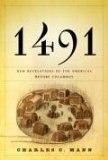Summary | Excerpt | Reading Guide | Reviews | Beyond the Book | Readalikes | Genres & Themes | Author Bio

Critics' Opinion:
Readers' Opinion:
First Published:
Aug 2005, 480 pages
Paperback:
Oct 2006, 528 pages
 Book Reviewed by:
Book Reviewed by:
BookBrowse Review Team
Buy This Book
Beginning in the 1970s, Axtell, Neal Salisbury, Francis Jennings, and
other historians grew dissatisfied with this view. "Indians were seen as
trivial, ineffectual patsies," Salisbury, a historian at Smith College,
told me. "But that assumption—a whole continent of patsies—simply didn't
make sense." These researchers tried to peer through the colonial
records to the Indian lives beneath. Their work fed a tsunami of inquiry
into the interactions between natives and newcomers in the era when they
faced each other as relative equals. "No other field in American history
has grown as fast," marveled Joyce Chaplin, a Harvard historian, in
2003.
The fall of Indian societies had everything to do with the natives
themselves, researchers argue, rather than being religiously or
technologically determined. (Here the claim is not that indigenous
cultures should be blamed for their own demise but that they helped to
determine their own fates.) "When you look at the historical record,
it's clear that Indians were trying to control their own destinies,"
Salisbury said. "And often enough they succeeded"—only to learn, as all
peoples do, that the consequences were not what they expected.
This chapter and the next will explore how two different Indian
societies, the Wampanoag and the Inka, reacted to the incursions from
across the sea. It may seem odd that a book about Indian life before
contact should devote space to the period after contact, but there are
reasons for it. First, colonial descriptions of Native Americans are
among the few glimpses we have of Indians whose lives were not shaped by
the presence of Europe. The accounts of the initial encounters between
Indians and Europeans are windows into the past, even if the glass is
smeared and distorted by the chroniclers' prejudices and
misapprehensions.
Second, although the stories of early contact—the Wampanoag with the
British, the Inka with the Spanish—are as dissimilar as their
protagonists, many archaeologists, anthropologists, and historians have
recently come to believe that they have deep commonalities. And the
tales of other Indians' encounters with the strangers were alike in the
same way. From these shared features, researchers have constructed what
might be thought of as a master narrative of the meeting of Europe and
America. Although it remains surprisingly little known outside
specialist circles, this master narrative illuminates the origins of
every nation in the Americas today. More than that, the effort to
understand events after Columbus shed unexpected light on critical
aspects of life before Columbus. Indeed, the master narrative led to
such surprising conclusions about Native American societies before the
arrival of Europeans that it stirred up an intellectual firestorm.
Coming of Age in the Dawnland
Consider Tisquantum, the "friendly Indian" of the textbook. More than
likely Tisquantum was not the name he was given at birth. In that part
of the Northeast, tisquantum referred to rage, especially the rage of
manitou, the world-suffusing spiritual power at the heart of coastal
Indians' religious beliefs. When Tisquantum approached the Pilgrims and
identified himself by that sobriquet, it was as if he had stuck out his
hand and said, Hello, I'm the Wrath of God. No one would lightly adopt
such a name in contemporary Western society. Neither would anyone in
seventeenth-century indigenous society. Tisquantum was trying to project
something.
Excerpted from 1491 by Charles C. Mann Copyright © 2005 by Charles C. Mann. Excerpted by permission of Knopf, a division of Random House, Inc. All rights reserved. No part of this excerpt may be reproduced or reprinted without permission in writing from the publisher.





The Funeral Cryer by Wenyan Lu
Debut novelist Wenyan Lu brings us this witty yet profound story about one woman's midlife reawakening in contemporary rural China.
Your guide toexceptional books
BookBrowse seeks out and recommends the best in contemporary fiction and nonfiction—books that not only engage and entertain but also deepen our understanding of ourselves and the world around us.